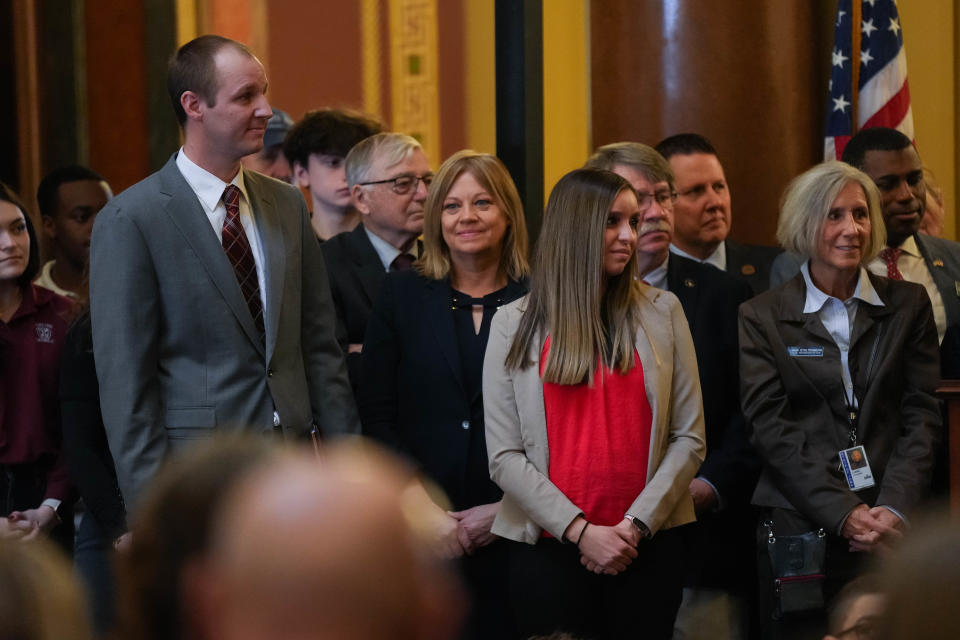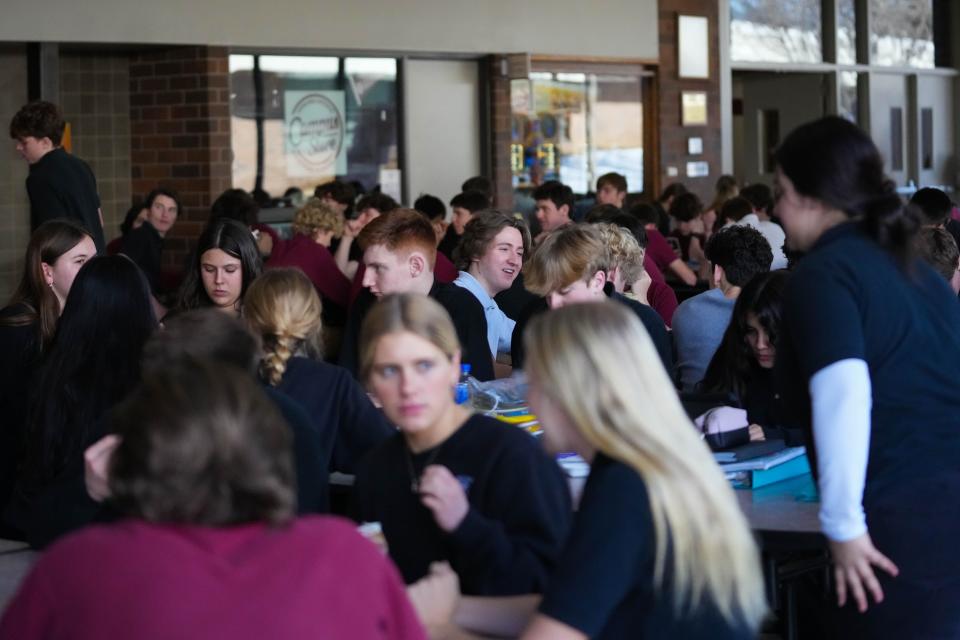62% of Iowans oppose Gov. Kim Reynolds’ private school scholarships law, Iowa Poll finds
- Oops!Something went wrong.Please try again later.
© Copyright 2023, Des Moines Register and Tribune Co.
Iowans oppose Gov. Kim Reynolds’ signature “school choice” law, which allows families to use taxpayer money to pay for private schools, by nearly a 2-to-1 margin, according to a new Des Moines Register/Mediacom Iowa Poll.
More than six in 10 Iowans, 62%, oppose the law. The program will allow every Iowa family to receive about $7,600 annually per student in an education savings account to pay private school costs such as tuition and fees.
Just over a third of Iowans favor the policy, at 34%. Another 4% are not sure.
The law is also unpopular with a similar majority of parents with children in public schools, the poll found.
The poll of 805 Iowa adults was conducted March 5-8 by Selzer & Co. It has a margin of error of plus or minus 3.5 percentage points.
Reynolds centered her 2022 reelection campaign on the theme of providing more choices in education and giving parents more control over their children’s schooling. She won reelection by 19 percentage points.
More:Will Iowa's broad 'school choice' law mean no choice for LGBTQ and special-needs students?
She made private school scholarships the centerpiece of her annual Condition of the State address in January. Republican lawmakers swiftly passed the legislation and sent it to the governor for her signature just two weeks after it was introduced.
But her plan to use taxpayer money to pay for students' private school faces majority opposition from a host of groups: Democrats and Republicans, men and women, urban and rural dwellers, as well as Iowans with children under 18.
Deb Maschke, a poll respondent from Waverly, opposes the law. She said it makes it seem like the state is giving up on its public schools.
“When states do this, they are hanging up a big sign that says, ‘We have lousy public schools. We know it. We’re sorry. We’ll give you money to send your kid to another school,’” said Maschke, 70, who is a retired project manager and a Democrat.
Iowans opposed previous private school proposals, but more narrowly
This year was Reynolds’ third attempt to pass some version of “school choice” legislation, and her most expansive proposal.
It also generated the greatest opposition among Iowans compared with previous “school choice” proposals tested in earlier Iowa Polls.
The new law will phase in over three years and eventually allow all Iowa families, regardless of income, to receive about $7,600 per student each year in education savings accounts.
Public school districts will also receive about $1,200 for each student within their district's boundaries who receives an education savings account — including for children who already attend private school.
However, those districts will lose the $7,600 in per pupil funding for every student who leaves to go to a private school.
The law is expected to cost the state about $345 million annually once it’s fully in place.
More:Jubilant Kim Reynolds signs Iowa's seismic 'school choice' bill into law. What it means:
Reynolds’ two previous attempts failed to win enough support in the Iowa House, despite their narrower scope.
In 2022, Reynolds proposed a program that would have been limited to families making less than 400% of the federal poverty level. That program would have been capped at 10,000 participants statewide.

An Iowa Poll conducted Feb. 28-March 2, 2022, asked about taxpayer funding for private schools but worded the question differently from the language in this year’s poll.
In 2022, Iowans were asked whether they favored or opposed initiatives in the Legislature to “use funds for public schools to help parents pay costs of nonpublic schools or homeschooling for grades K through 12.” More than half of Iowans opposed such initiatives, with 52% against and 41% in favor.
In 2021, Reynolds proposed a much more limited version, which would have given state-funded scholarships to students at just 34 school buildings statewide that were designated as in need of “comprehensive support and improvement.”
A March 2021 Iowa Poll question, worded the same as in 2022, found opposition by 49% of Iowans and support by 44%.
Republicans, independents, Democrats, parents all oppose the law
The law’s passage came over the opposition of a dozen lawmakers from Reynolds’ own party — nine in the House, and three in the Senate.
The Iowa Poll found a narrow majority of Republicans (51%) oppose the “school choice” law, while 44% of Republicans are in favor.
Political independents closely mirror the state as a whole, with 63% opposed and 34% in favor.
Democrats overwhelmingly oppose the law, with 82% opposed and 12% in favor.
More:Who voted for Kim Reynolds' private school scholarships bill? These maps tell the story

Iowans who voted for former President Donald Trump in 2020 are evenly split, with 47% in favor and 47% opposed.
“I don’t know why we would pay for kids to go to private school,” said Cole Reynolds, a 29-year-old poll respondent and a Republican. “That’s something the parents, if they want their kids to go to private school, they should have to pay for that. That’s how it’s always been.”
Cole Reynolds, who lives in Alexander and is a truck driver, has three kids who attend public school.
He said he doesn’t see his opposition as political. To him, “it just sounds like people are looking for handouts” to send their kids to private school.
“It doesn’t seem like something a Republican would want to vote for,” he said.
Reynolds is among a majority of Iowa parents who oppose the new law.
More:Which Iowa kids could 'school choice' help most? These 3 maps tell the story:
More than half of parents with children in public school oppose the policy, 61% to 36%. Similarly, Iowans with children under the age of 18 oppose it, 59% to 38%.
Russel Kennedy, a 51-year-old Republican poll respondent from Hawarden, lands in favor of the new education savings accounts. He said families should not be “locked into whatever school fits in their district.”
“The parents know where the better schools are in town,” said Kennedy, a warehouse worker.
Kennedy’s two grown children attended public school, but he would have considered moving them to a private school if education savings accounts were available at the time.
Catholics and Protestants oppose the law; evangelicals narrowly favor it
Evangelicals are the only group where a plurality approve of the law, though narrowly, with 49% in favor and 46% opposed.
Fifty-seven percent of Catholics oppose the new law, while 39% are in favor. The split was the same for Protestants.
All but six of Iowa’s 183 nonpublic schools have religious or spiritual affiliations, according to an analysis by the Des Moines Register.
Maschke, who is Catholic, previously lived in Ohio. She sent her daughter to parochial school there because she felt “it was important that the views that I raised her with at home were also part of her education.”
“It was a choice I made,” she said. “So, if I want to make that choice, then I pay for it. You don’t go to the state and say, ‘I don’t like the way you’re running your public schools, so I want you to give me money to send my kids to someplace else.’”
Maschke said she doesn’t believe tax dollars should go to religious schools.
“Where is the division of church and state?” she said. “Because that’s what we preach.”
FAQs: How is the Des Moines Register/Mediacom Iowa Poll conducted? We answer your top questions.
Poll respondent Robert “Sam” Braden, 36, is the pastor of Hope Bible Church and the mayor of Fredonia. He said he favors education savings accounts but believes they should not be funded at the cost of public education.
“More options for people is better than fewer options,” said Braden, an independent. “And when I say that I'm in favor of school choice, I don't necessarily think we should be taking money away from the public schools, but, I think, the education budget should be raised across the board.”
Braden and his wife have already begun talking about how they want to educate their two young children since there are no nearby private schools.
Still, he said he believes the education savings accounts program will help families.
“Just because I can't benefit from something doesn’t mean I don’t think other people should,” Braden said.
Stephen Gruber-Miller covers the Iowa Statehouse and politics for the Register. He can be reached by email at sgrubermil@registermedia.com or by phone at 515-284-8169. Follow him on Twitter at @sgrubermiller.
Samantha Hernandez covers education for the Register. Reach her at (515) 851-0982 or svhernandez@gannett.com. Follow her on Twitter at @svhernandez or Facebook at facebook.com/svhernandezreporter.
About the Poll
The Iowa Poll, conducted March 5-8, 2023, for The Des Moines Register and Mediacom by Selzer & Co. of Des Moines, is based on telephone interviews with 805 Iowans ages 18 or older. Interviewers with Quantel Research contacted households with randomly selected landline and cell phone numbers supplied by Dynata. Interviews were administered in English. Responses were adjusted by age, sex and congressional district to reflect the general population based on recent American Community Survey estimates.
Questions based on the sample of 805 Iowa adults have a maximum margin of error of plus or minus 3.5 percentage points. This means that if this survey were repeated using the same questions and the same methodology, 19 times out of 20, the findings would not vary from the true population value by more than plus or minus 3.5 percentage points. Results based on smaller samples of respondents — such as by gender or age — have a larger margin of error.
Republishing the copyright Iowa Poll without credit to The Des Moines Register and Mediacom is prohibited.
Iowa Poll methodology
This article originally appeared on Des Moines Register: Iowa Poll: Kim Reynolds’ private school accounts opposed by majority

